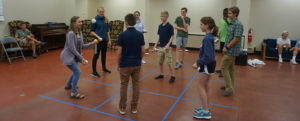This ‘19-‘20 series is inspired by the book Margin (1995, 2004 by Richard Swenson, M.D.) and the widespread phenomenon of mental health issues and burnout in today’s society. “The Margin Series” focuses on the reality that every one among us has limits regarding time, emotional energy, physical energy, and money, among other areas. I’ll cover a wide variety of topics where we need margin for optimal function as well as availability to love and serve others.
My personality comes standard with a penchant for burnout. Although I maintain that my default attitude and action pattern is that of laziness, apathy, gluttony, and other undesirable characteristics, I have found at many times over my 50 years of life that I have tended to over-do my attempts to overcome my vices through verging on (or surpassing) my limits. In every decade since my pre-teens, I’ve dabbled with “marginless” living, at least in certain areas, and only negative things result.
So what does it mean to be “marginless” (or its synonym, overloaded), and what about its antidote, “margin”? Futurist and physician Dr. Richard Swenson puts it this way:
“Marginless is fatigue; margin is energy.
Marginless is red ink; margin is black ink.
Marginless is hurry; margin is calm.
Marginless is anxiety; margin is security.
Marginless is culture; margin is counterculture.
Marginless is the disease of the new millennium; margin is its cure.”
—Richard Swenson, Margin (Colorado Springs: NavPress, 2004), p. 13.
Regarding my own career in youth work, I’ve frankly struggled with thinking I’m lazy if: 1) I hire someone to do a job that I could do myself; 2) I stop offering an activity out of seemingly selfish motives; 3) I say “no” to a request or even an email or phone call when I don’t have an immediate good reason to not jump at the chance to serve or respond; and 4) I neglect doing more to recruit, advertise, and otherwise plead for more rookies, more campers, more club days, more investment on behalf of my members & families.
During one of my recent quarterly visits to get my teeth cleaned (I’m literally paying for my former life-long sugar addiction), my hygienist, Wendy Mortenson, shared a bit of wisdom that stuck with me. She said that when her children were younger than school age, their daycare provider hired staff when it appeared that she could have simply done the job herself. One business-savvy customer thought that to be inefficient to her bottom line, but the daycare owner asserted that if she were to try to “do it all,” she’d quickly run out of patience for the parents and young children she served. She traded profit margin for relational fruit. This priority made the provider a great blessing in the Mortenson family’s life and made her own life more balanced (albeit less lucrative) at the same time.
While there are obvious parallels between myself as JUGHEADS Director and the daycare provider described above, this message extends to every person involved in our company, from young rookies to seasoned seniors to the 20-something staff to middle-aged parents. We all need margin. None of us can do it all. We all have limits in every area of our lives; the tricky part is knowing those limits and then backing off so that we’re not hovering around the brink of burnout or overload at every turn.
Over the course of this school year, I’ll feature a different aspect of the concept of margin each month. Far from being a self-indulgent exercise of personal reflection, I hope to echo the wisdom of Dr. Swenson, the Bible, and empirical evidence of human limits to encourage people, even our 7-18-year-old Jugheads, to practice cultivating and guarding margin in life. Much of our pain comes from unrelenting progress of exponential growth in information, technology, unrealistic expectations, and schedule demands—increasingly so as we’re about to enter the 2020’s. The prescription to that pain is margin, whether a relaxed time at snack, a gradual departure after 6 p.m., rests between long juggling runs, or lending a hand rather than only thinking of oneself. The prognosis is health, not only for a good year as a Jughead, but for a balanced life overall.
Join me on this journey to seek balance and to mentor it in others.



